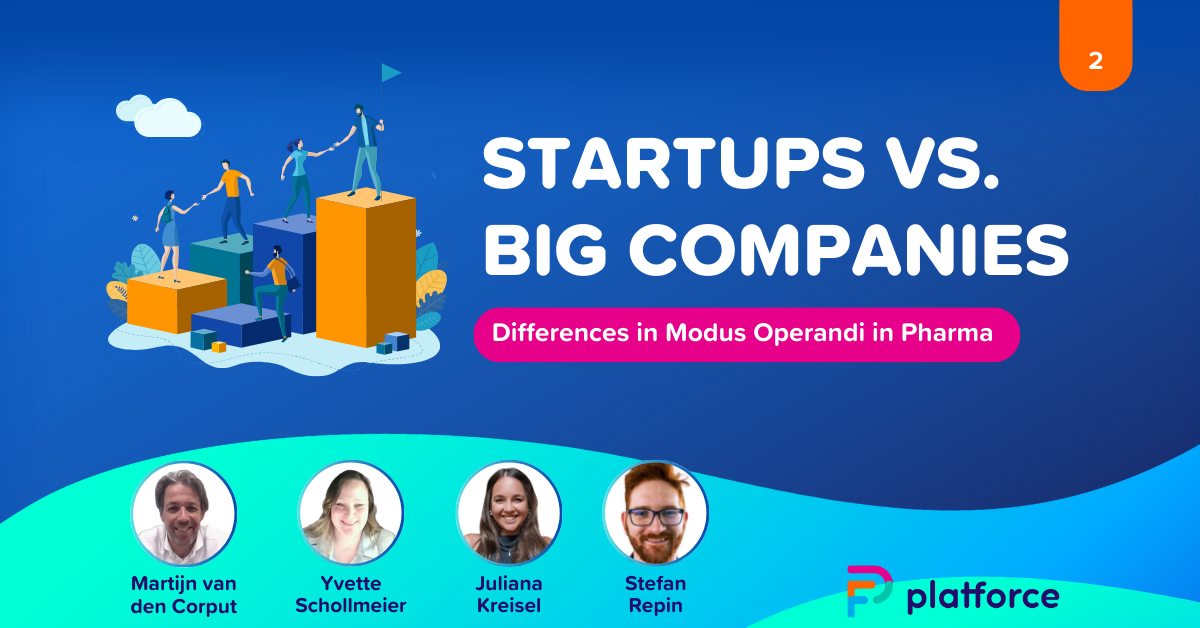In the ever-evolving landscape of the pharmaceutical and life sciences industries, understanding the operational dynamics between startups and large corporations is crucial. The second episode of Platforce’s Pharma Insights webinar series, “Startups vs Corporations: Differences in Modus Operandi,” looked at such contrasts, offering valuable insights from industry experts Dr. Yvette Schollmeier, Founder of Q&C at Schollmeier, and Martijn van den Corput, CEO at OptInsight.
Hosted by Platforce’s Head of Marketing, Stefan Repin, and Events Manager, Juliana Maria Kreisel, the webinar opened with a discussion on the fundamental differences between large corporations and startups in the pharma industry. Dr. Schollmeier and Mr. van den Corput shared their extensive experiences, highlighting the unique challenges and advantages each type of organization faces.
Watch the full webinar recording:
Flexibility and Speed: The Startup Advantage
Startups, by nature, are agile and more willing to take risks, which can be a significant advantage in the fast-paced pharma industry, noted Dr. Yvette Schollmeier:
“Startups are more flexible and faster, willing to adjust and adopt digital customer relation management systems”.
This flexibility allows startups to innovate rapidly, implement new technologies, and adapt to market changes more swiftly than their larger counterparts. Martijn van den Corput echoed this sentiment, highlighting that startups often have a greater sense of urgency due to limited resources and the need to prove their viability quickly:
“There is more pressure on results in startups because they have more to prove,” he noted.
This pressure can drive startups to achieve remarkable feats in shorter timeframes, pushing the boundaries of innovation and efficiency.
The Corporate Strength: Resources and Stability
On the other hand, large corporations possess significant resources, including funding, established infrastructure, and extensive networks. These assets can provide stability and enable large-scale operations that startups might struggle to achieve. Dr. Schollmeier pointed out that big corporations, although slower to adapt, have the financial muscle to invest in comprehensive R&D and long-term projects without immediate financial pressure.
However, this stability often comes with a cost: slower decision-making processes and a tendency to stick to traditional methods. The bureaucracy inherent in large corporations can hinder their ability to pivot quickly in response to new opportunities or threats. This was highlighted during the webinar, where the speakers discussed the challenges large corporations face in embracing digital transformation and innovative technologies.
Regulatory Compliance and Quality Management
Both startups and corporations in the pharma industry must navigate a complex web of regulations and quality management standards. Dr. Schollmeier shared her experiences working in both environments, noting that while the regulatory requirements are similar, the approach to compliance can differ significantly. Startups, driven by the need to establish themselves, may adopt more innovative compliance strategies, leveraging digital tools to streamline processes. In contrast, corporations might rely on established, albeit slower, procedures that ensure compliance but may lack the agility of their smaller counterparts.
Marketing Strategies: Tailoring to the Audience
Marketing in the pharma industry presents unique challenges, especially given the stringent regulations surrounding drug promotion. Startups often need to be more creative and aggressive in their marketing efforts to build brand awareness and acquire clients. They tend to leverage digital marketing and social media more effectively, reaching their target audiences with tailored messages.
Dr. Schollmeier highlighted the importance of understanding and adapting to these regulations, sharing that “marketing in highly regulated industries like pharma requires a nuanced approach, balancing compliance with creativity”. Startups, with their nimble structures, are often better positioned to experiment with innovative marketing strategies, whereas corporations may stick to more traditional methods.
AI and Machine Learning: A Double-Edged Sword
The integration of AI and machine learning in pharma is another area where startups and corporations diverge. Startups are generally more open to adopting these cutting-edge technologies, using AI for tasks ranging from drug discovery to personalized marketing. This willingness to embrace AI can provide startups with a competitive edge, allowing them to operate more efficiently and innovate continuously.
Conversely, large corporations, while recognizing the potential of AI, may be slower to implement these technologies due to the scale of their operations and the inherent risk aversion in their organizational culture. Martijn van den Corput pointed out that “big pharma companies are often skeptical and reluctant to use cloud-based AI services for drug design,” highlighting the cautious approach of larger entities towards new technologies.
The Path Forward: Collaboration and Innovation
The webinar concluded with a discussion on the potential for collaboration between startups and corporations. Both Dr. Schollmeier and Mr. van den Corput agreed that fostering partnerships could lead to mutually beneficial outcomes, combining the agility and innovation of startups with the resources and stability of corporations. By working together, these organizations can accelerate the pace of innovation, improve regulatory compliance, and ultimately deliver better outcomes for patients.
Final Thoughts
The differences between startups and corporations in the pharma industry are stark, each with its unique strengths and challenges. Startups bring flexibility, speed, and a willingness to embrace new technologies, driving rapid innovation and adaptability. In contrast, corporations offer stability, extensive resources, and established processes, ensuring compliance and sustained growth.
As the pharma landscape continues to evolve, understanding these differences and leveraging the strengths of both types of organizations will be crucial. By fostering a collaborative ecosystem, the industry can harness the best of both worlds, driving forward innovation and delivering improved healthcare solutions globally.
About Platforce
Platforce’s cloud-based CRM and CLM makes full sales cycle management for Pharmaceutical and Life Science companies completely painless. Book a demo of Platforce with our team to learn more!

